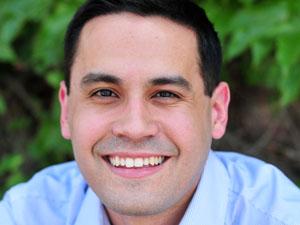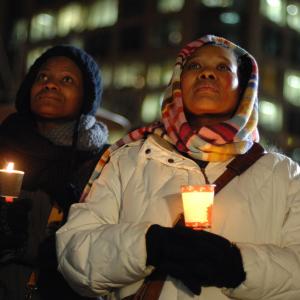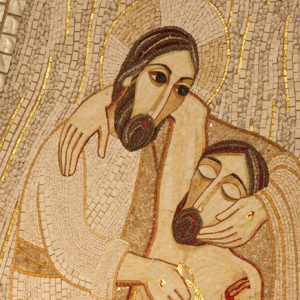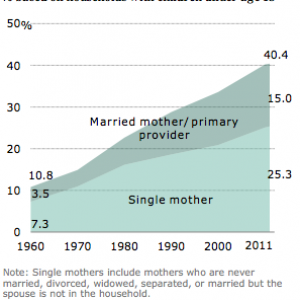
Eric D. Barreto is Weyerhaeuser Associate Professor of New Testament at Princeton Theological Seminary and an ordained Baptist minister. The author of Ethnic Negotiations: The Function of Race and Ethnicity in Acts 16 (Mohr Siebeck, 2010), the co-author of Exploring the Bible (Fortress Press, 2016), and editor of Reading Theologically (Fortress Press, 2014), he is also a regular contributor to ONScripture.org, the Huffington Post, WorkingPreacher.org, and EntertheBible.org. For more, go to ericbarreto.com and follow him on Twitter (@ericbarreto).
Posts By This Author
How to Love Power
Power can be transformative, but only if power is suffused with love. As Andy Crouch has written, “Power at its worst is the unmaker of humanity—breeding inhumanity in the hearts of those who wield power, denying and denouncing the humanity of the ones who suffer under power.… Power, the truest servant of love, can also be its most implacable enemy.”
Resistance Is Prophetic

Image via Sergei Bachlakov/Shutterstock.com
Perhaps the most important role of the prophet is rousing us from our stupor. When we get tired, when we are weary of resisting, when we are told over and over again that this is how things are going to be, the prophet’s call is clear. God has something better for us. Something liberating. Something just. Something transformative.
'Except This Foreigner?'

Image via Mauro Rodrigues/Shutterstock.com
Jesus’ statement seems to be more than a mere observation of fact. His also seem to have an edge of condemnation and dismissal. As I heard Anna Carter Florence once observe, Jesus does not even speak to this healed leper but over him. “This foreigner” is barely present in the scene, though he alone of the ten who were healed has acted faithfully.
What the Bible Says About Leadership and Dishonest Real Estate Deals

Image via Olivier Le Queinec / Shutterstock.com
If we were to go by the titles of books about leadership, we might be tempted to imagine that good leadership is a matter of following the right set of instructions. And this might work if we could all agree what good leadership is. The roiling presidential season just might suggest otherwise.
What Can the Book of Revelation Say to Us This Election Season?

Image via Roman Mikhailiuk / Shutterstock.com
The presidential race has invited all kinds of rash predictions. “If that candidate gets elected, it will be a disaster.” “If that candidate is president, I will move to Canada.” In each case, the prediction of a future disaster is supposed to convince us to act differently in the present. “The election of a certain candidate would be so awful, that we must stop it. Or I’ll move to Canada.” Key parts of our political discourse are predictions of a dire future if a certain candidate is elected.
Can We Experience Resurrection in the Wake of Terror?

Image via Valentina Calà/Flickr
In the space between Palm Sunday and Good Friday, between the acclaiming of Jesus as a king and his execution as a threat to the political order, I was no more ready to read the news this morning. The stifling, exhausting repetition of violence and terrorism is both all too common but still shocking. And yet, I hope that Christians in particular can draw upon the narrative arc that moves us from Jesus’ triumphal entry to his seeming defeat on Calvary.
These Days, We Need a John the Baptist

Image via Alek-Sa / Shutterstock.com
Perhaps here is where we need John the Baptist most. He might turn to us and call us to ordinary acts of grace. He might call us to give what we have. He might call us to stay at our jobs and do them well. He might call us to the radical idea that seemingly ordinary lives can be imbued with the extraordinary spirit of God to transform the world.
During this Christmas season, we expect to enjoy times of family and conviviality and joy. Such expectations have been shattered this year. We could throw our hands up in despair. We could lament over a shattered world. We could grieve those we have lost, the dreams that have been shattered. We could pray fervently for courage and hope. We could worship together and so resist the encroachments of death upon our lives. We could protest and march and demand change. We could call our representatives and demand action.
We should do all these things.
And as we do all these things, we should also live ordinary lives infused by the extraordinary call to love God and love neighbor.
John the Baptist is an irritant in the midst of Advent.
In the Gospel reading for this week in Luke 3:7-18, he is in the wilderness excoriating the crowds who came seeking baptism and repentance and deliverance.
“Who warned you…?,” John wants to know. Who told you to come out here? What did you think you would find? Who the crowds find is a fiery prophet of God, preaching judgment upon the injustice that permeates this world.
Scandalous Leaders, Scandalous Power
Political scandals are evergreen.
On any given week, one or another political leader, cultural star, or renowned athlete are experiencing an embarrassing and public downfall. Recently, we’ve born witness to the fall of a former Speaker of the House and a reality television celebrity. Next week, a new cast of characters will take their place. So ubiquitous are such scandals that they are the backdrop for the television show Scandal, a show I know is on because my Facebook page explodes with conversation about it!
But here’s the odd thing about these scandals, these falls from grace: they are so common that they shouldn’t shock us anymore. And yet these scandals sell newspapers, draw eyes on television. We can always muster some outrage at these all too common crimes.
Will We Listen to God's Call and Baltimore's Cry?
Perhaps we are here again because we do not really listen. We gaze at each other’s pain and lament, but we don’t really see in a way that will shift our vision, clarify our perspective. We hear each other’s stories but don’t really listen in a way that will change us in a profound way, lead us to question our deepest held assumptions. We post a hashtag but don’t embody these digital signatures in our everyday lives?
Celebrate Resurrection by Selling All Your Possessions
Inequality is a relentless blight. The hopelessness too often engendered when a lack of resources aligns with insufficient educational access, the easy prejudice of one's neighbors, and the ubiquity of oppression is dehumanizing and crushing.
In recent days, much of our political discourse has focused — at least in words — on economic inequality. From the left and right alike, laments arise about the shrinking of the middle class and the widening and yawning gap growing between those who are thriving in a rebounding economy and those left behind by a rising Dow.
The next presidential campaign will likely be dominated by questions of economic justice and the American promise that hard work and perseverance can yield a better life. Is this dream a myth or reality? How we answer this question will say much about our hope in the future, our trust in one another, our faith in a God who promises life abundant, though an abundance that comes in a form we might not expect.
You Don’t Want To Be A Prophet
You don’t want God to ask you to be a prophet. You really don’t.
When God calls you to some holy task, you might expect a contemplative path, a quiet life of service, and love of neighbor. You might expect a comfortable life of piety and hopefulness, grace, and caring.
But true prophets know better.
Prophets tend not to have such idyllic hopes for God’s call. Prophets know too well that the call of God to speak hard truths is paved with difficulty. The prophet’s road is lonely not because she escapes the hubbub of everyday life in order to retreat and draw near to God. No, the prophet’s road is lonely because she is called to the most troubled corners of the world, places which existence we would rather deny or ignore. The prophet’s road is lonely because she must speak boldly to an upside-down world that doesn’t realize it is upside-down. The prophet sees the world as it really is while we see the prophet and marvel that she is walking on the ceiling.
In our readings for this week, we encounter two prophets who speak bold words to a world predisposed to ignore them. We encounter two prophets who speak a word of deliverance to the downtrodden and judgment upon the powerful. We encounter two prophets engaged with the most pressing matters of all. We encounter two prophets that we still refuse to heed.
Resisting a Culture of Fear
Fear is in the air.
Ebola. War. Conflict. Economic turmoil. Political victories. Political losses. This is the stuff of the nightly news. And everywhere we look we have a new villain to worry about, a new threat against which we ought to brace, a new sense of hopelessness.
This is nothing new, of course. The world has always been a scary place. If anything, we have become inured to the greatest threats we might face. With roofs over our heads and weather forecasters to warn us of impending storms and economic structures to cushion us from financial catastrophe, we keep many dangers at bay.
And yet in the midst of so much safety and comfort, we seem to search compulsively for something to fear, something to raise our ire, something that will keep us up at night. It is not enough to feel safe apparently; for some reason, fear is too tempting.
Anytime these world disasters emerge — whether disease or storm or war or financial crash — some Christian or another will step to the microphone to declare the end of days. Things have never been this bad before. The global crisis is unprecedented. This can only mean the dawn of the end as we know it.
Then again, the same could have been said in the days when the plague was ravaging Western Europe. The same could have been said by the victims of Western expansion in the Americas. The same could have been said by our grandmothers and grandfathers as the economic system crumbled before their eyes in the Great Depression. The same could have been said by a Jew facing the Holocaust. The same could have been said by the Nigerian girls who were stolen for the sake of a deluded ideology.
Disasters are not new. Recent disasters do not erase old ones. And old ones do not discount new ones.
ON Scripture: Blessing Those Who Have Cursed Us
Sometimes, we teach children the oddest Bible stories.
It is certainly curious that we would decorate baby nurseries with images from the story of Noah’s Ark. The smiling elephants in the comically tiny boat must always be blocking out the mass of humanity and animal life drowning under a seemingly never-ending deluge.
The story of Jonah is another favorite in the Sunday School classroom. And for those of us who remember the story, one aspect of the narrative is most memorable. We remember that Jonah is eventually consumed by a whale or a fish or some sea creature. He spends three days in that great beast’s belly only to be jettisoned when he has finally learned his lesson.
But what lesson exactly did he learn? For some reason, being devoured and then regurgitated by a huge fish is more memorable than the point of this story. Jonah 3:10-4:11 contains the rest of the story, a story we would do well to consider anew today.
Heaven Is a Home
When I was a child, my vision of heaven was riddled with roller coasters and populated by Disney characters. Let me explain.
Growing up in Puerto Rico, the American “mainland” to our north was for me a dreamland of sorts. You could catch a glimpse of it on television show depicting Main Streets lined with impressive trees. And of course, there was Disney World. As a five-year old visiting Florida for the first time, I imagined that the rest of the country was just like that particular corner of Orlando that we tourists saw.
That was heaven on earth for the five-year-old version of me. Heaven was earthly and joyful and fun and sweet. But as we all know Disney is no paradise. I don’t expect long lines, lots of sweat, and expensive but mediocre food in heaven.
When I was five, Disney was my vision of heaven. As I grew up in the church, my vision turned upward. Heaven was an eternal destination deferred until the moment after you die. Heaven was a place of reward and eternity. Heaven was an ethereal experience, something so otherworldly that the best we could do was speak in metaphors and images about it. Heaven, in short, had very little to do with the world as we knew it.
Neither vision gets it quite right.
How to Be Perfect
“Be perfect, therefore, as your heavenly Father is perfect” (Matthew 5:48). Seriously, Jesus? Have you even met some of us? Have you seen the depths of our jealousies, the breadth of our greed? Have you noticed how insatiable our egos are? How deeply insecure we all are?
Perfect?
You cannot mean what you seem to mean.
What then do we do with this seemingly impossible call? For many of us, this is one of those passages in the Bible we seek to explain away. Jesus can’t possibly mean what he says here. We reckon that he must be calling us merely to aspire to perfection. Or we conclude that in calling us to perfection, we realize how very far we are from it and thus lean on God’s grace. But certainly, absolutely, without a doubt, Jesus cannot be calling us to be perfect like God is perfect.
Right?
On Scripture: Good Samaritans All Around
In recent weeks, a number of controversial and divisive political questions have dominated the news. Race and voting rights, abortion in Texas, and marriage equality at the Supreme Court have opened anew the scars of old political and cultural wars.
In this conflicted political ambit, the Samaritan's bold compassion is a needed reminder today. Let’s remember to be kind to the stranger, certainly. But just as important is that the story of the Good Samaritan also invites us to imagine ourselves in a different part of this narrative.
Imagine yourself not as the Samaritan seeking to love God and neighbor. Imagine yourself as the person in need. A man on the brink of death. A woman in deepest grief. A man lost in the world. A woman with no hope. Imagine yourself at your most vulnerable, deep in despair with only one hope: perhaps someone will help me.
On Scripture: Women, Work, and the Word
A recent Pew poll revealed a significant shift in American families. Four in 10 of this country’s households now rely primarily on the income of women.
This is both good news and bad. For many women, new opportunities are allowing them to be the primary breadwinners in their families. In some careers, women are chipping away at the very real glass ceiling so many have and continue to face. Our efforts towards equality have made some strides. Some strides.
At the same time, a significant majority of households who rely primarily on women’s incomes are single-mother households living in poverty or near-poverty. Structural barriers lead almost inexorably to more complicated and difficult lives for these families. From health care and food costs to child-care and educational expenses, they face greater challenges because of structural obstacles we so often unwittingly endorse and from which we even benefit.
Some things never change.
Majesty and Tragedy in Oklahoma
“O Lord, our Sovereign, how majestic is your name in all the earth! You have set your glory above the heavens.” And from those heavens descended a deadly cloud.
“Out of the mouths of babes and infants ...” The children of Plaza Towers Elementary?
“What are human beings that you are mindful of them, mortals that you care for them?” Indeed that is the question that troubles the heart of the faithful in times like these.
Can we still praise God? If so, how do we start? Can we possibly understand what happened in Moore, Okla.?
Don’t trust anyone who claims to comprehend the meaning of this storm. Don’t trust anyone who points with absolute certainty to a single cause for this storm. Don’t trust anyone who treats a tornado as anything but indiscriminate and cruel. These tragedies are not punishments or object lessons. Such natural forces do not reach their conclusion with a pat moral or a simple “they lived happily ever after.”
On Scripture: When People You Don’t Much Like Receive God’s Love
Our distaste for people who cut in line remains unchanged as we grow up. Whether someone gets to the front of the lunch line or the airport security check before us in an unfair way, our annoyance is raised. People who steal our parking spots during the Christmas season are the recipients of our worst thoughts. We might — just might — yell a string of expletives and death threats at anyone who has wronged us on the road or in a parking lot.
It’s not just about being orderly and following the rules. Instead, we rue the flouting of justice and fairness. I have been waiting patiently in line; what gives you the right to deem yourself better than me?
Yet if we’re honest, we will quickly realize that such outrageous reactions to outrageous behavior are no better than the line cutter or parking space thief. Moreover, our sense of injustice is quite attuned to moments of personal grievance even as we neglect how our actions may harm others. If anything, these moments of rage reveal much more about us than those we think have aggrieved us.
On Scripture: How to Vote like a Christian
It seems so easy, doesn’t it? Love God. Love your neighbor. The two greatest commandments encapsulate the core of faith and could — if we really were to trust God — transform the world.
Similarly then and with election day looming, voting should be an easy affair: people of faith should vote for the candidates whose policies would most embody a love of God and neighbor.
It seems so easy, but it isn’t if we are honest with ourselves and gracious towards those who disagree with our political persuasions. No single party or candidate has a monopoly on loving God and neighbor. Moreover, people of passionate faith and commitment to the values Jesus commends in Mark 12:28-34 so often can’t even agree on what these seemingly simple commandments mean.
Such disagreements about what it means to love God and neighbor are at the very center of so many of our political debates.
Some Christians will vote for President Obama, arguing that the most loving thing we can do for our neighbor is to build a stronger social net. Some Christians will vote for Mr. Romney, arguing that the most loving thing we can do for our neighbor is let loose the power of the market to create good-paying jobs for all. Some Christians will cast a ballot for Mr. Romney in support of his stance on abortion. Some Christians will cast a ballot for President Obama, noting that the availability and affordability of basic health care is a pro-life position.
All of us, if we are honest, will vote for a flawed candidate.













